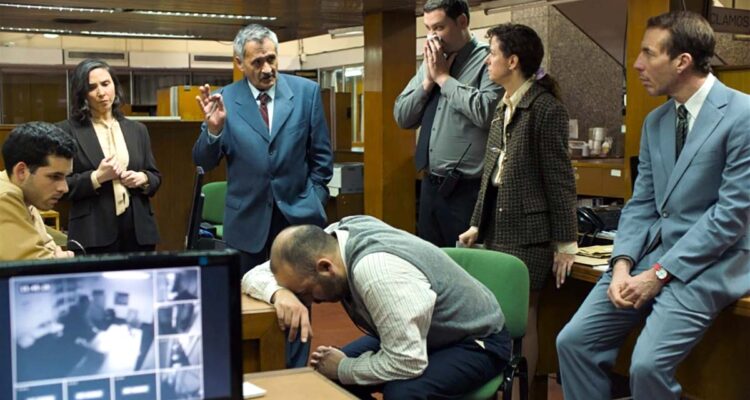Within the first few minutes of “The Delinquents,” Del Toro (Germán De Silva), the manager of a Buenos Aires bank, longs for the days when people were allowed to smoke anywhere: on airplanes, at restaurants, etc. He mourns that past as a time of greater freedom, until a colleague challenges him to reconsider the statement—the dictatorship ruled in those days.
Del Toro backpedals and clarifies that what he misses is the notion that everybody smoked. In that communal dependance to nicotine, or the acceptance of it, freedom means upholding status qup. Later on, a split screen showing the film’s protagonists, each smoking in their respectively chosen “cells,” illustrates a larger point about the cages we put ourselves in consciously and those that we enter as victims of our inherently human weaknesses of character.
Part of that early smoke break conversation is Morán (Daniel Elías), a middle-aged, single man convinced that he’ll soon be able to finally quit cigarettes for good—out of sheer will power. But for as much as Morán wants to believe he can sculp his own destiny, detached from the societal chains that keep the masses unhappy, our shared tendency for perpetual dissatisfaction and other constraints beyond our control will have their say about his plan.
Over the next three hours, writer-director Rodrigo Moreno methodically unfurls a genius tragicomedy on the elusive nature of freedom: an idealized state in which, in theory, one does as one pleases at all times. But Moreno isn’t advocating for people to live hedonistic existence or for unchecked individualism, instead probing the practical feasibility of such goal. In the pursuit of perfect liberty, his characters find themselves even more shackled.
Still, Morán carries on with an act of self-determination. He conspicuously steals his entire salary for the next 25 years and that of co-worker Román (Esteban Bigliardi) from the bank. He then entices Román to help him with the promise of financial independence and the joy of quitting their soul-crushing jobs if only they can keep the money hidden while Morán goes to prison for no more than three years after turning himself in for the crime.
Throughout the many vicissitudes the pair undergoes to make it to their endgame, the tone-shifting score maps the tale’s many moods, from the most vibrant of tango-inspired sounds, a mysterious melody of intrigue, and even a psychedelic atmosphere. In turn, moments of wry levity come not from the quality of the performances, all actors play their parts with straightforward naturality, but from the minutia in quotidian monotony: an insufferably squeaky office chair or an oblivious person with unquenchable thirst drain the solemnity even from the most pressing instances.
Under the suspicion of the other bank employees and an aggressive investigator, who believe he helped carry out the robbery, Román, a placidly unremarkable man living with his longtime girlfriend, begins to experience the dread of guilt over the firing of innocent bystanders and the temptation of having the bag of cash within arm’s reach at home.
The trick of Bigliardi’s unassuming performance is portraying someone who had previously resigned himself to a lifetime of meaningless work who suddenly sees an opportunity for another way of life. There’s a cautious eagerness and a new twinkle in his eye. Conversely, Elías’ collected demeanor as Morán, even as he faces the threat of violent prison, responds to the character’s determination to play within the system—serving time behind bars before enjoying his riches—in order to ultimately thrive outside of it.
READ MORE: 2023 Cannes Film Festival: 21 Must-See Movies To Watch
In one of his most ingenious narrative treats, Moreno offers De Silva as a manifestation of an ironic duality, almost as if warning his heroes that total freedom doesn’t actually exist. De Silva conspicuously plays two roles: Del Toro, who has spent years withering at the bank without escape, and Garrincha, a Brazilian-born inmate higher in the jail’s hierarchy than Morán. Both versions presumably hold positions of power, and yet the two remain imprisoned.
For both Morán and Román, whose names further imply their correlation as two sides of the same run-of-the-mill coin, this midlife crisis or awakening comes with a romantic element attached to it, namely a woman from a rural area named Norma (Margarita Molfino) whose grounded place in the world and in her own reality further reassures Morán of his fantasy of a pastoral life and that literally riding into the sunset is freedom.
Moreno’s writing moves along at a comfortable pace to efficiently examine Morán and Román’s concurrent ordeals, but it’s only when the men individually experience a chapter of reinvigorating serenity in the countryside that the film becomes overly precious. Still, “The Delinquents” captures this emotional oasis with a leisurely rhythm, even if perhaps sometimes becomes a bit much.
Perhaps freedom does mean time to pursue one’s wishes with aimless abandon or maybe something more concrete: like a book that can transport you past the confines of a physical space, as Morán learns while being an inmate. But what if it’s nothing more than an unattainable hope, as Morán’s funky favorite song, Pappo’s Blues, “Adonde Esta la Libertad” (Where Is the Freedom) ponders? Should we all still be rushing to get a taste?
Like De Silva’s nostalgia for the days of judgement-free smoking, we may hold dear memories of periods where in hindsight we felt restrained. Upon reminiscing with more clarity, however, one may see that even then the utopia of self-governing our fates was distant. As part of the absurd agony of being alive, it’s a human curse to remain prisoners to our desires, to our commitments to others, and, more significantly, to our imagined futures that might not materialize as we first envision them. So we go on, moving from one prison to the next, thinking that somehow we are inching closer to a truly unbound state. [A-]
Follow along with all our coverage from the 2023 Cannes Film Festival.

